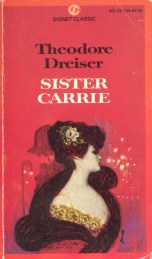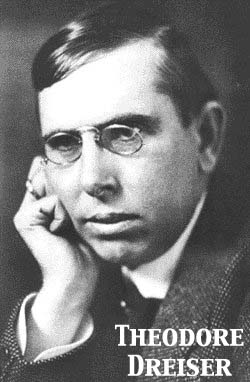
In the novel, Sister Carrie, Theodore Dreiser further explores the “Cinderella” concept that swept many hopeful individuals into the city of Chicago. Caroline Meeber, better known as Sister Carrie, travels to the city from her rural home in hopes of discovering a better life. What she finds, however, is less than perfect living conditions and struggle.

From the very beginning of her Chicagoan experience, Carrie is discouraged
by the chains that bind her to her sister’s walls. She understands that
what is socially acceptable for a woman is the life her sister leads, but
she refuses to hold herself back only because it is the acceptable thing to
do. Instead, she longs to break herself from the chains and explore the city.
In response to her clouded image of what life could be, Carrie quits the job she finds in a run-down factory. She abandons her noble status as a working woman, complete
with meek possessions, and advances to a life with Drouet, a man who promises
the world. Drouet provides for Carrie; he provides her with lavish clothes,
and a greater sense of status than that of her sister and brother-in-law.
He cares for her in all the ways that he can, keeping her happy and using her
for her companionship.
Carrie dreams of an even more prolific life, despite the promotion she has
gained from Drouet’s companionship. Eventually, the opportunity for
her to gain status arrives with an offer from Drouet. He comes across a dilemma
where he needs an actress for a small theatre production in which he is
involved. Immediately, he thinks of his charismatic companion, Carrie. Reluctant
at first, Carrie agrees to be a part of the production, in return for all
that Drouet provides for her. Little did she know the world would open
from the small role she would play.
Carrie’s performance sparks a deep interest of theatre within her. She discovers an
outlet from the grimness of the city and a new way to gain status. Her
eyes sparkle from the many compliments she receives and she thrives off of the
attention she gains from her small performance. The material benefits and cheerful
reviews only leave Carrie wanting more. She finally discovers her passion; this seems to be the first step toward achieving a name in society.
Sister Carrie represents the minority population prevalent during the turn of the nineteenth century. Women simply could not obtain a well-paid job, as they were expected to perform domestic activities instead. Like a small percentage of the female Chicagoans, Carrie resists the domestic mentality yet she contributes to the female gender role. Her actions, though not traditional, are risky in the sense that most people would consider them morally unacceptable. She feels as though she needs to act in a way that deviates from the social roles of the time in order to elevate her position. She takes a leap in a direction that only the male population would dare to cross. Carrie always finds a way to manipulate the men in order to understand exactly how they achieve such status and lives through their successes.

Carrie eventually develops an affair with Drouet’s superior, Hurstwood,
due to her constant search for the greatest amount of material and social
wealth. Through Hurstwood, she is able to achieve a greater amount of material
items, status and recognition. She is given a sense of worth
as his companion, one in which she did not feel with her sister’s family,
and one she does not feel as strongly with Drouet. Eventually, after Hurstwood
performs a heist, Carrie leaves Drouet and flees to New York with Hurstwood.
Carrie rids herself of social luxuries. After arriving in New
York, Hurstwood breaks down and becomes completely worthless. Forced to making
some sort of career and living, Carrie turns to the one thing she knows she
can do well—acting. She starts out small and then her acting career
takes off. She supports Hurstwood for a short time, but then abandons him
when she realizes his incapacity and her career flourishes.
For Carrie, her life revolves around status and material security. She embraces
the atmosphere of the city, always wanting what is new and popular and wanting
to do the “it” thing. Her life seems to take lucky turns, which
allows for each step towards fame. In a position where she could have risked
her survival, she still resists an honorable, yet poor life. She takes the
extra steps toward gaining status that she considers desirable. In the end,
she becomes what she has always wished for—a prominent social figure.
Theatre provides Carrie with a way to dream and to step out of the unbearable
life in which she is living. Like many people who came to Chicago in search
of a better life, Carrie dreams of prosperity and success the second she
steps off of the train. The difference between those who dreamed and Carrie
is that she takes her dreams and turns them into reality. With it, she gains all
the other factors that provide a truly prosperous city life--status,
fame, and everything else that she has dreamed of. The theatrical air of the
city captures Carrie and sweeps her away into a world of tangible dreams.